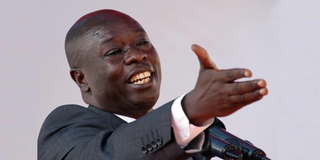Premium
Asset Recovery Agency disowns DCI over Rigathi Gachagua’s Sh200m case

Deputy President Rigathi Gachagua.
Deputy President Rigathi Gachagua is staring at yet another big win in court after the Asset Recovery Agency disowned evidence by the Directorate of Criminal Investigations (DCI), which was used to nail him and his Sh200 million, which was forfeited to the state seven months ago.
ARA now says the money was legitimately acquired income and not proceeds of crime as had been presented in court, which led to the forfeiture decision.
In filings in court, a police investigator attached to ARA, Sergeant Fredrick Musyoki, says the government agency never investigated allegations by the DCI that Mr Gachagua obtained the money fraudulently from state institutions and Bungoma County.
No verification
In an affidavit filed at the Court of Appeal, Mr Musyoki says when the DCI raised the claim, ARA seized the wealth without conducting its own verification.
The Agency now concedes that the tenders awarded to Mr Gachagua’s trading companies were not mired in fraud. Mr Gachagua, who had argued that the case was politically instigated, got the money from business dealings with government institutions and the Bungoma government between 2011 and 2016 after executing several contracts.
The investigator says that last month, ARA conducted its own independent investigations and established that “the companies performed their obligation as per the terms and conditions of the contracts to the satisfaction of the institutions.”
“There were no complaints or defaults raised or issued against the said contractor during or after the execution of the contract,” adds Mr Musyoki in documents filed at the Court of Appeal.
ARA says it is ready to let the DP off the hook based on a discovery that the wealth is legit. “The evidence obtained has satisfactorily explained the source and legitimacy of the funds at issue and the ARA is satisfied that the same is not proceeds of crime as was initially perceived and should be released to Mr Gachagua and Ms Anne Kimemia,” the police investigator further says.
ARA, he says, forfeited the money on the basis of inconclusive investigations conducted by the DCI in a separate case that has since collapsed for lack of evidence. If dropped, it will be the Deputy President’s second victory after another court case involving alleged graft was recently thrown out after it emerged that investigators had been pressured to fix Mr Gachagua.
The DCI arrested and arraigned Mr Gachagua in 2020 without evidence to support the alleged fraud and economic crimes. The DP has attributed this to political persecution by the previous administration. He was Mathira MP at the time. In his affidavit, Sergeant Musyoki, says ARA used the same police case to forfeit Sh200,773,228 owned by Mr Gachagua together and Ms Kimemia (trading as Jenne Enterprises Limited).
Disclosing that Mr Gachagua was also fixed in the forfeiture suit, Mr Musyoki says ARA had believed the allegations raised by the DCI. Recent decision by Director of Public Prosecutions (DPP) Noordin Haji to withdraw the graft case prompted ARA to conduct fresh investigations last month. In the case, it emerged that former DCI boss George Kinoti pressured his investigators to fix Mr Gachagua.
The funds, held at Rafiki Micro-finance Bank, were proceeds of business contracts executed by four entities associated with Mr Gachagua with various government institutions between 2011 and 2016. He had not joined politics at the time. The trading entities are Specific Supplies Limited, Triple Eight Construction (K), Wamunyoro Investment and Encarter Diagnostic Limited.
“The facts and evidence relied upon by the Agency were mainly the same as the ones used by the Director of Public Prosecutions in the criminal case in which Mr Gachagua was charged,” said Mr Musyoki.
The case by ARA led to a judgment by the High Court on July 28, 2022, forfeiting the funds to the government.
However, Mr Musyoki says on November 9, 2022, ARA learnt that the criminal case was being withdrawn by the DPP on the basis that investigations by the DCI had not been exhausted and there was not enough evidence to sustain criminal trial.
ARA also obtained an affidavit filed by DCI lead investigator Kuriah Obadiah detailing how Mr Gachagua had been fixed. Upon perusal of the court’s ruling on the withdrawal of the case, Mr Musyoki says it became apparent for ARA to re-evaluate the forfeiture suit and evidence because the veracity of the evidence presented by the DCI was shaken, according to Mr Obadiah’s affidavit.
Resulting from the development, ARA sought information from government entities that had conducted business with Mr Gachagua and which had paid the funds in dispute pursuant to works and services rendered.
The institutions include the Kenya Tsetse and Trypanosomiasis Eradication Council (Kenttec), the State Department of ASALs and Regional Development, the Kenya Power, State Department of Lands and Physical Planning and the Bungoma government.
Mr Musyoki says that from Kenttec, ARA learnt that the institution had contracted Specific Supplies to “provide services for supply of impregnated targets”.





